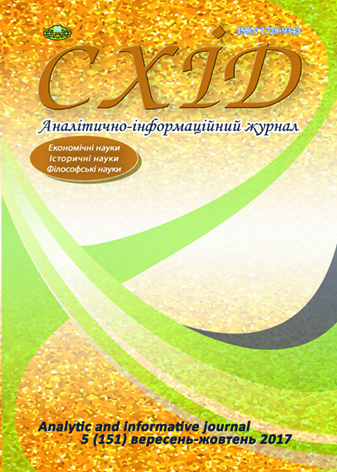Conceptualization of nomadism and sedentarism in hyphspace: modern socio-cultural discourse
DOI:
https://doi.org/10.21847/1728-9343.2017.5(151).195543Keywords:
nomads, neonomads, hypernomads, infra-nomads, sedentaries (settled / agrots), hyperclass, discourse, nomadic practices, hyphspaceAbstract
The article deals with the etymological component of the concepts of “nomads”, “neomonads”, “hypernomads”, “infra-nomads”, “sedentaries”, “settled” and “agrots”. It has been found out that neomonads and hypernomads will occupy a privileged position in society (the hyperclass - by Jacques Attali). It has been proved that “infra-nomads”, “sedentaries”, “agrots” and “settled”, that is, people who are known to be as rooted but drifting, “re-territorizing” the environment, are constantly striving to achieve the status of neomads through developing and using nomadic practices. The term “sedentaries” is explained to include “settled” and “agrots”, representatives of the agricultural sector of economy. The author has studied nomadic practices of representatives of the middle class of the social ladder (nomads and sedentaries). It has been concluded that the formation of consciousness inherent in neomonads appears to be a complex, long-lasting and multifaceted process regarding nomads and sedentaries. A society developing in hyphspace must necessarily include both nomads and sedentaries, which will constantly be striving to reach the status of neomonads in order to survive.Downloads
References
Bitikchi, E. (2011). Sedentarizm v issledovanii kochevnikov (na primere debatov o kochevom gosudarstve). Available at: http://www.gumilev-center.ru/sedentarizm-v-issledovanii-kochevnikov-na-primere-debatov-o-kochevom-gosudarstve (rus)
Deleuze, J. and Guattari, F. (2010). Tysyacha plato: Kapitalizm i shizofreniya [The Thousand Plateaus: Capitalism and Schizophrenia] (translat. from French). Ekaterinburg: U-Factoria; Moscow: Astrel, 895 p. (rus)
Deleuze, J. (2011). Logika smysla [Logic of meaning] (translat. from French). Moscow: Akademicheskiy proyekt, 472 p. (rus)
Dvoretskiy, I. Kh. (comp.) (1958). Drevnegrechesko-russkiy slovar (Ancient Greek-Russian Dictionary): Vol.1 (A - L). Moscow: Publishing House of Foreign and nat. dictionaries, 1045 ps. (rus)
Andrushchenko, S.V. (2015). Mondializm. In: Entsyklopediya suchasnoyi Ukrayiny. Avaialble at: http://esu.com.ua/search_articles.php?id=69164
Knysh, I. V. (2017). Antropolohichnyy trend: usvidomlenyy suyitsyd (homo mobilis). Materials of the scientific-practical conference of teachers, graduate students and students of Sumy NAU: in 3 volumes, Vol.1 (April 19 - 21, 2017, Sumy): pp.221 (ukr)
Knysh, I. V. (2017). Nomadic practices of a person’s “varying boundaries”: Homo Mortido vs Homo Mobilis. Skhid, 4(150): 98-102. DOI: https://doi.org/10.21847/1728-9343.2017.4(150).195517
Knysh, I. V. (2016) Filosofskyy dyskurs: rhizoma vs radix vs hyphe. Filosofiya i politolohiya v konteksti suchasnoyi kultury, 6 (15): 157-164 (ukr).
Youth subcultures. Avaialble at: http://www.spbdeti.org/id1729/printversion
Orwell, J. (1989). "1984" and essays of different years: a novel and artistic journalism (translat.). Moscow: Progress, 386 p. (rus)
Pochebut, L. G. (2017). Sotsialnaya psikhologiya. [Social psychology]. St.Petersburg: Piter, 399 p. (rus)
Sorokin, P. A. (1992). Chelovek. Tsivilizatsiya. Obshchestvo [Man. Civilization. Society] (trans. from English). Moscow: Politizdat, 1992. 543 p. (rus)
Urry, J. (2012). Mobility. Moscow: Praxis, 576 p. (rus)
Fursov, A. I. (2014). Mirovaya kapitalisticheskaya sistema: novyye stsenarii razvitiya (versiya Zhaka Attali). Znaniye. Ponimaniye. Umeniye. 1: 102-114. (rus)
Shlyakov, A. V. (2016). Nomadizm i agrotizm. K postanovke problemy. Chelovek. 1: 30-35. (rus)
Yarovoy, A. V. (2009). Agon i nomadizm. Gumanitarnyye i sotsialno-ekonomicheskiye nauki. 4: 113-117 (rus).
Attali, J. (2011). Une brève histore de l’avenir. Paris: Fayard, 2011. 412 p. (french)
Bennett, A. (1999). Subcultures or Neo-Tribes? Rethinking the Relationship between Youth, Style and Musical Taste. Sociology. Vol. 33, no. 3 (August). P. 599-617. (eng)
Federn, P. (1952). Ego Psychology and the Psychoses. New York: Basic Books, 1952. 395 р. (eng)
Fourastié, J. (1989). Le grand espoir du XXe siecle. Paris: Gallimard, 427 p. (french)
Maffesoli, M. (2000). Le temps des tribus: Le déclin de l’individualisme dans les sociétés postmodernes. Paris : La Table Ronde, 330 р. (french)
Downloads
Published
How to Cite
Issue
Section
License
Copyright (c) 2017 Inna Knysh

This work is licensed under a Creative Commons Attribution-NonCommercial-NoDerivatives 4.0 International License.
1. Authors bear responsibility for the accuracy of facts, quotations, numbers and names used.
2. Manuscripts are not sent back.
3. The publisher does not always agree with the authors' opinion.
4. The authors reserve the right to authorship of the work and pass the first publication right of this work to the journal under the terms of a Creative Commons Attribution-NonCommercial-NoDerivatives 4.0 International License. This license allows others to distribute (copy) the published work for non-commercial purposes, provided there is mandatory attribution to its authors and a link to the first publication in our journal.
5. The authors have the right to conclude separate supplement agreements that relate to non-exclusive work distribution in the form in which it has been published by the journal (for example, to upload the work to the online storage of the journal or publish it as part of a monograph), provided that the reference to the first publication of the work in this journal is included.

